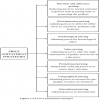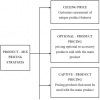MARKETING MANAGEMENT - Pricing Methods
New Product Pricing Strategies - Pricing Methods
Posted On :
Pricing strategies usually change as the product passes through its life cycle as illustrated in the previous lesson.
New Product Pricing
Strategies
Pricing strategies usually change as the product passes through its life cycle as illustrated in the previous lesson. The introductory stage is especially challenging. Firms bringing out an innovative patent-protected product can choose between two options, viz. market-skimming pricing and market-penetration pricing.
Pricing strategies usually change as the product passes through its life cycle as illustrated in the previous lesson. The introductory stage is especially challenging. Firms bringing out an innovative patent-protected product can choose between two options, viz. market-skimming pricing and market-penetration pricing.
Market-skimming pricing
Many
firms that invent new products initially set high prices to ‘skim’ revenues
layer by layer from the market. At product introduction in the marketplace, the
firm may charge the highest price it could given the benefits of its new
product over competing products. The firm sets a price that made it just
worthwhile for some affordable segments of the market to adopt the new product.
After the initial sales slowdown, the firm may lower the price to draw in the next price sensitive layer of the customers. In this way, a
The quality and image must support its higher price and enough buyers must want the product at that price. Also the cost of producing a small volume cannot be so high that they cancel the advantage of charging more. In the mean time, competitors should not be able to enter the market easily and undercut the price. A skimming strategy offers several benefits to the markets, as listed below:
1. It allows a manufacturer to quickly recover its research and development costs.
2. It also allows a firm to maximize revenue from a new product before competitors enter the field.
3. A skimming strategy offers a useful tool for segmenting a product’s overall market on a price basis.
4. It permits marketers to control demand in the introductory stages of a product’s life cycle and then adjust productive capacity to match demand.
The chief disadvantage of skimming strategy is: it attracts competition. Potential competitors see innovative firms reaping big financial gains and decide to enter the market. This new supply forces the price even lower than its eventual level under a sequential skimming procedure. However, if patent protection or other proprietary ability allows a firm to exude competitors from its market, it may continue a skimming strategy for a relatively long period.
Rather than setting a high initial price to skim off small but profitable market segments, some firms set a low initial price in order to penetrate the market quickly and deeply – to attract a large number of buyers quickly and win a large market share. A penetration pricing strategy may also extend over several stages of the product life cycle as the firm seeks to maintain a reputation as a low-price competitor. Since many firms begin penetration pricing with the intention of increasing prices in
1. Penetration pricing works well under the following conditions:
2. A good or service experiences highly elastic demand
3. The market is highly price sensitive and a low price stimulates market growth
4. Production and distribution costs fall with accumulated production experience
5. A low price helps discourage actual and potential competition
After the initial sales slowdown, the firm may lower the price to draw in the next price sensitive layer of the customers. In this way, a
The quality and image must support its higher price and enough buyers must want the product at that price. Also the cost of producing a small volume cannot be so high that they cancel the advantage of charging more. In the mean time, competitors should not be able to enter the market easily and undercut the price. A skimming strategy offers several benefits to the markets, as listed below:
1. It allows a manufacturer to quickly recover its research and development costs.
2. It also allows a firm to maximize revenue from a new product before competitors enter the field.
3. A skimming strategy offers a useful tool for segmenting a product’s overall market on a price basis.
4. It permits marketers to control demand in the introductory stages of a product’s life cycle and then adjust productive capacity to match demand.
The chief disadvantage of skimming strategy is: it attracts competition. Potential competitors see innovative firms reaping big financial gains and decide to enter the market. This new supply forces the price even lower than its eventual level under a sequential skimming procedure. However, if patent protection or other proprietary ability allows a firm to exude competitors from its market, it may continue a skimming strategy for a relatively long period.
Market-penetration pricing
Rather than setting a high initial price to skim off small but profitable market segments, some firms set a low initial price in order to penetrate the market quickly and deeply – to attract a large number of buyers quickly and win a large market share. A penetration pricing strategy may also extend over several stages of the product life cycle as the firm seeks to maintain a reputation as a low-price competitor. Since many firms begin penetration pricing with the intention of increasing prices in
1. Penetration pricing works well under the following conditions:
2. A good or service experiences highly elastic demand
3. The market is highly price sensitive and a low price stimulates market growth
4. Production and distribution costs fall with accumulated production experience
5. A low price helps discourage actual and potential competition
Tags : MARKETING MANAGEMENT - Pricing Methods
Last 30 days 769 views














